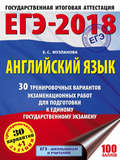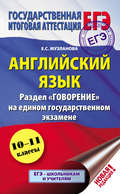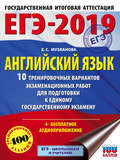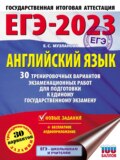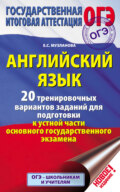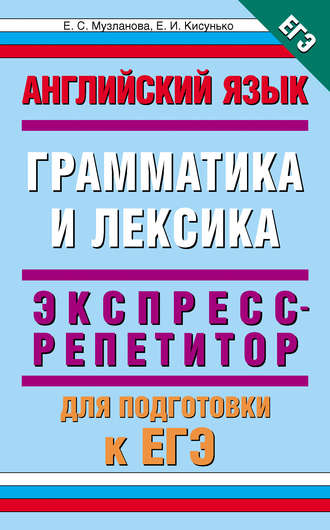
Е. С. Музланова
Английский язык. Экспресс-репетитор для подготовки к ЕГЭ. «Грамматика и лексика»
2.3. REFLEXIVE PRONOUNS
Test 6. Fill in the correct reflexive pronouns.
1. What will you do with______ this morning?
2. They were whispering among ______.
3. We should seldom speak of ______.
4. I drive the car ______.
5. Did you see the manager ______?
6. I often walk by ______.
7. His grandmother lives by ______.
8. The house______ is not worth much.
9. He has the habit of talking to ______.
10. He cut ______.
11. She told me the news ______.
12. The machine works by ______.
13. He______ told me that story.
14. They are making fools of ______.
15. She stretched______ out on the sofa.
16. She is interested only in ______.
17. She lives by ______.
18. Help______ to coffee.
19. Make______ at home!
20. He______ conducted the interview.
Test 7. Fill in the correct reflexive pronouns.
1. The girl decorated the room ______.
2. The winner looked very proud of ______.
3. She brought up her children by ______.
4. The cat is washing ______.
5. The children enjoyed______ when they visited Disneyland.
6. She was afraid of spiders, so she didn’t go into the room by ______.
7. She decided to do all the cooking ______.
8. He was asked to behave______ at school.
9. He shouted loudly to make______ understood.
10. Cats are very clean animals: they are always washing ______.
11. Doctors advised us that we have to exercise ______regularly in order to keep healthy.
12. In ______your problem is nothing to worry about.
13. She loves looking at______ in the mirror.
14. If you don’t behave ______, I shall put you all to bed early.
15. The music was so loud that I had to shout to make ______heard.
16. The teacher tried to make______ understood but she failed to get the class to understand.
17. We painted the room ______.
18. She was very pleased with ______when she got such a good job.
19. I think I’d go back to France. We really enjoyed______ there.
20. I don’t feel______ today. I don’t know what’s wrong with me.
2.4. DEMONSTRATIVE PRONOUNS

Test 8. Fill in the correct demonstrative pronouns.
1. Which flowers do you want? ______or ______?
2. Excuse me, is______ your bag?
3. They talked about ______and ______.
4. Which shoes do you like most? ______or ______?
5. ______’s why they accepted his proposal.
6. ______is Ann speaking.
7. After______ they decided not to come.
8. ______will do.
9. I’ll take______ books.
10. He’s been waiting______ three weeks.
11. She went to______ doctor and ______, no result.
12. ______day was the worst of his life.
13. I’m tired out.______ ’s why I’m going home early.
14. George likes Mary, but she doesn’t like him. ______’s what annoys him.
15. The engine starts and the light goes on. ______’s when you press the button.
16. ‘They’re getting engaged in April.’ ‘ ______’s marvellous.’
17. ______was the biggest mistake in his life.
18. ‘We’re moving to London.’ ‘ ______’s fantastic!’
19. ______ is what I think.
20. ______will help her to come in time.
Test 9. Fill in the correct demonstrative pronouns.
1. I never forget my holiday in London. ______was the holiday of a lifetime.
2. What are you doing ______ Sunday?
3. Didn’t you just love ______ striped trousers in the shop we just passed?
4. Mmm! ______ is the best cake I’ve ever tasted!
5. Do you see ______ boy over there? He’s my cousin.
6. Hello, ______ is Mr Cook. Can I speak to Mr Brown, please?
7. I can’t go out in ______ coat. It’s too tight.
8. ‘I’ve been accepted by my first choice of university.’ ‘Congratulations. ______ is fantastic!’
9. ______ were the days when we used to dance every night.
10. Don’t you think ______ new electronic diaries that we saw in the shop are really clever?
11. ‘______ belonged to my grandmother,’ said David as he slipped the ring onto Jane’s finger.
12. Don’t you think ______ jeans suit me?
13. ______ biscuits are delicious. Did you make them yourself?
14. ______ records you threw out were my original hits from the seventies!
15. Aren’t ______ girls over there your students?
16. ‘______ bike needs repairing.’ ‘______ is what I was trying to tell you.’
17. What do you think of ______ dress Ann was wearing last night?
18. I don’t go anywhere ______ week.
19. What’s ______ you’re reading?
20. ______ boy over there is my son.
2.5. SOME, ANY, NO, EVERY AND THEIR COMPOUNDS
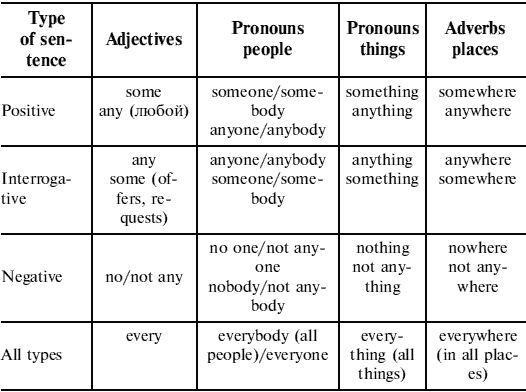
Test 10. Fill in some, any, no, every.
1. I’ve met ______ people, but I don’t have ______ real friends.
2. ‘Is there ______ petrol in the tank?’ ‘Yes, there must be ______ left.’
3. I’m sorry but there are ______ cookies left.
4. Have you ______ idea what time it is?
5. She had ______ games, but she didn’t have ______ computer games.
6. ‘Have you got ______ matches?’ ‘Yes, I think I’ve got ______ in my pocket.’
7. I can’t talk to you now. I’ve got ______ time.
8. Could you give me ______ examples?
9. I see him at work almost ______ day.
10. Everything was correct. There were ______ mistakes.
11. We get ______ letters from her month.
12. There weren’t ______ potatoes left.
13. There were ______ tomatoes left.
14. Would you like ______ milk?
15. I’d like to ask you for ______ advice.
16. Her car wasn’t ______ better than ours.
17. ______ of the information has already been used.
18. ______ country has a national flag.
19. It hasn’t made ______ difference.
20. ______ child can learn to read and write.
Test 11. Fill in some, any, no, every or their compounds.
1. Is there ______ meat in the fridge?
2. There isn’t ______ fish, either.
3. Can I have ______ coffee, please?
4. Take ______ book you would like to read.
5. She said ______ but I didn’t understand it.
6. He went to the shop but he didn’t buy ______.
7. There is ______ in the box. It’s empty.
8. I can do this job alone. I don’t need ______ to help me.
9. They’ve got ______ cheese but they haven’t got ______ bread.
10. I’m looking for my keys. Has ______ seen them?
11. ______ has taken my camera. I can’t find it.
12. He hasn’t got ______ eggs to make an omelette.
13. I heard a noise. There is ______ in the cupboard.
14. Look! ______ is sitting at the train station, waiting for a train!
15. ______ knows anything about her concert.
16. There was ______ selling tickets near the hall.
17. ______ Is in the room?
18. ______ student has to obey school regulations.
19. ‘Have you got ______ to tell me?’ ‘No, really’.
20. I walk with my friend’s dog ______ Sunday.
Test 12. Fill in some, any, no, every or their compounds.
1. There’s ______ milk in that jug. It’s empty.
2. She wanted ______ stamps but there weren’t ______ in the machine.
3. I’m afraid there isn’t ______ coffee left.
4. Is there ______ here who speaks Italian?
5. I’d like to buy ______ clothes but I haven’t got ______ money.
6. Would you like ______ juice?
7. She put her handbag down ______ and now she can’t find it.
8. Haven’t you got ______ friends in London?
9. We had to walk home because there was ______ bus.
10. Does ______ want a cup of tea?
11. I’ve looked ______ for my passport, but I can’t find it ______.
12. Come and have supper with us if you aren’t doing ______ tonight.
13. Are there ______ letters for me?
14. I’d like to make ______ friends, but I haven’t met _________ young people yet.
15. Jane is getting married to ______ she met on holiday.
16. Tommy is so nice. ______ likes him.
17. I can’t talk to you now. I’ve got ______ time.
18. I don’t know ______ about economics.
19. The accident looked serious but fortunately ______ was injured.
20. I am hungry. I want ______ to eat.
Test 13. Fill in some, any, no, every or their compounds.
1. I did Exercise 1 without ______ help.
2. ‘Would you like ______ more mineral water?’ ‘I don’t want ______ more.’
3. It was a public holiday, so there were ______ shops open.
4. My sister never has ______ trouble learning foreign languages.
5. This evening I’m going out with ______ friends of mine.
6. When we were on holiday, we went to the beach ______ day.
7. Why don’t you ask your father to lend you ______ money? I haven’t got ______.
8. Does ______ want a game of tennis?
9. What’s that smell? Is ______ burning?
10. I asked if ______ wanted an ice-cream, but ______ did, so I just bought one for myself.
11. Did ______ phone me while I was out?
12. Your face looks terribly familiar. I’m sure I have seen you ______ before.
13. She left the room without saying ______.
14. This doesn’t look a very nice restaurant. Can we go ______ else?
15. I have ______ more to say to you. Goodbye.
16. I have never been ______ more beautiful than Scotland.
17. ‘What do you want for supper?’ ‘ ______. I don’t mind.’
18. It was Sunday, and the town was deserted. ______ was in the streets, and ______ was open.
19. ‘Who was at the party?’ ‘ ______. Pete, Anna, James, Kathy, all the Smiths, Sally Beams and Sally Rogers.’
20. ‘Where do you want to go on holiday?’ ‘______ hot. I don’t care if it’s Greece, Spain, Italy or the Sahara, but it’s got to be hot.’
3. NUMERALS
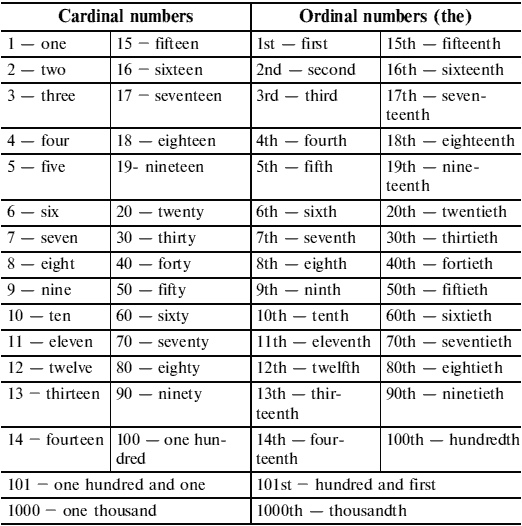
Test 1. What is the next number? Write it out in words.
1. 2, 4, 6, ______. 11. 10, 20, 30, ______. 21. 21, 24, 27, ______.
2. 7, 8, 9, ______. 12. 20, 40, 60, ______.
3. 2, 5, 8, ______. 13. 30, 60, 90, ______. 22. 31, 33, 35, ______.
4. 11, 13, 15, ______. 14. 60, 70, 80, ______. 23. 47, 48, 49, ______.
5. 3, 6, 9, ______. 15. 100, 200, 300, ______.
6. 4, 8, 12, ______. 16. 90, 80, 70, ______. 24. 53, 54, 55, ______.
7. 5, 10, 15, ______. 17. 3, 2, 1, ______.
8. 16, 15, 14, ______. 18. 0, 1, 2, ______. 25. 64, 63, 62, ______.
9. 13, 15, 17, ______. 19. 70, 80, 90, ______.
10. 20, 18, 16, ______. 20. 10, 30, 50, ______. 26. 77, 76, 75, ______.
27. 88, 89, 90, ______. 28. 100, 99, 98, ______.
29. 25, 50, 75, ______. 30. 15, 30, 45, ______.
Test 2. Write the following cardinal and ordinal numbers.
3, 4, 9, 11, 19, 30, 41, 42, 74, 85, 99, 100, 510, 900, 999, 1000, 2537, 5200, 10000, 1000000
Test 3. Use the ordinal numbers.
1. This is page one. This is the ______ page.
2. This is flat five. This is the ______ flat.
3. Where is chapter ten? Where is the ______ chapter?
4. He doesn’t remember page 20. He doesn’t remember the ______ page.
5. Book two is about travelling. The ______ book is about travelling.
6. He doesn’t understand lesson nine. He doesn’t understand the ______ lesson.
7. What picture is on page 21? What picture is on the ______ page?
8. She lives on floor eleven. She lives on the ______ floor.
9. Let’s talk about chapter eight. Let’s talk about the ______ chapter.
10. What is the date on page one hundred and one? What is the date on the ______ page?
4. ADJECTIVES AND ADVERBS

Test 1. Write the comparative and superlative forms of these adjectives.
1. cold – 6. comfortable – 11. new —
2. big – 7. easy – 12. expensive —
3. wonderful – 8. fat – 13. hungry —
4. happy – 9. bad – 14. hot —
5. good – 10. nice – 15. little —
Test 2. Write the comparative and superlative forms of these adjectives.
1. cheap – 6. red – 11. difficult —
2. far – 7. noisy – 12. few —
3. hot – 8. terrible – 13. old —
4. cheerful – 9. late – 14. sleepy —
5. pretty – 10. bad – 15. thin —
Test 3. Complete the sentences with а necessary form of the words in brackets.
1. Your TV is much (good) than ours.
2. This is the (bad) film he’s ever seen.
3. His accent is (correct) than yours.
4. A woman seems to get (young) every year.
5. He’s the (fat) person in his family.
6. This is the (tasty) meal I’ve ever eaten.
7. She has a friend who’s much (pretty) than her.
8. She’s the (beautiful) in the class.
9. A friend of mine married a girl who is much (young) than him.
10. Everest is the (high) mountain in the world.
11. The (bad) thing in the world is dishonesty.
12. I think she is the (good) person who ever lived.
13. She is (tall) than her sisters.
14. What is the (fast) car in the world?
15. Her flat is (small) than ours.
Test 4. Complete the sentences with а necessary form of the words in brackets.
1. Your English is improving. It’s getting (good) and (good).
2. Who is the (famous) person in the world?
3. The meal cost (little) than I expected.
4. Are you the (old) in your family?
5. There are (few) public holidays in Great Britain than in other European countries.
6. He was as (white) as а sheet.
7. This cartoon is (funny) than that one.
8. Who is the (good) student in the class?
9. It was an awful day. It was the (bad) day of my life. 10. Jane is two years (old) than Jack.
11. She is not so (nervous) as her brother.
12. It is the (busy) time of the year.
13. I’d like to have а (big) car than my old one.
14. That’s the (far) I’ve ever run.
15. The exam was quite difficult – (difficult) than we expected.
16. The (great) national holiday in our country is Victory Day.
17. Hard beds are (healthy) than soft ones.
18. She is the (slim) girl in our group.
19. Which month is the (short) in а year?
20. What is the (late) news?
Test 5. Complete the sentences with а necessary form of the words in brackets.
1. These cakes are probably the (good) in the world.
2. I am (happy) than I have ever been.
3. The game will certainly be much (exciting) than it was last year.
4. For (far) information, please write to the above address.
5. The (old) member of her family is her Granny.
6. He did very badly in the exam – (bad) than expected.
7. He was the (fat) man 1 had ever met.
8. This is the (attractive) room in the whole house.
9. Our new house is (big) than the one we used to live in.
10. Jill can run as (fast) as Jack.
11. My brother has (much) money than I have.
12. This is the (bad) weather so far this year.
13. Travelling by train is (comfortable) than travelling by bus.
14. The bedroom isn’t so (light) as the living-room.
15. Tom is the (reserved) boy in this class.
16. It’s getting (hard) and (hard) to find а job nowadays.
17. Summer is the (dry) period of the year.
18. ‘What time shall we leave?’ ‘The (soon), the (good).’
19. It’s (cheap) to go by car than by train.
20. Tom looks (old) than he really is.
Test 6. Complete the sentences with а necessary form of the words in brackets.
1. This exercise is too easy – can’t we try а (difficult) one?
2. England’s too cold in spring – let’s go to Spain where it’s much (warm).
3. She comes top in all the exams – she must be the (clever) girl in the class.
4. The temperature in July reaches 44 degrees – it’s the (hot) month of the year.
5. Let’s buy this video – it doesn’t cost that much – it’s (cheap) than the other one.
6. This book is not so (interesting) as that one.
7. California certainly has а (healthy) climate than New York.
8. When I passed my driving test, it was the (happy) day of my life.
9. Lying down in bed is (comfortable) than sitting on а hard chair.
10. That’s the (exciting) story I’ve ever heard.
11. I’d like to have а (good) pen than this one.
12. She is the (young) daughter in the family.
13. Australia is much (far) from Europe than I thought.
14. The (quick) we finish, the (soon) we’ll go home.
15. This is the (bad) restaurant in town; I’ll never come here again.
16. Actions speak (loud) than words.
17. The (good) things in life are free.
18. She was the (boring) person at the party and I sat next to her all evening. It was awful.
19. I have а (bad) headache today than I did yesterday.
20. You’re as (bad) as your sister.
Test 7. Complete the sentences with а necessary form of the words in brackets.
1. I could hardly keep awake – it was the (boring) film I’ve ever seen.
2. The (high) you climb, the (far) you fall.
3. Bill is (rich) than John.
4. Prices have gone up. Things aren’t as (cheap) as they used to be.
5. Tokyo is (big) than New York.
6. Tokyo is Japan’s (large) city.
7. You certainly look much (happy) than you did yesterday.
8. The day grew (hot).
9. This is his (good) novel. The other novels are much (bad) than this one.
10. Jane is the (young) of the three sisters.
11. I get on well with my (old) sister.
12. This is the (funny) bit of the film.
13. He is obviously (interested) in sport than I am.
14. It was the (expensive) hotel we had ever stayed in.
15. (Good) late than never.
16. Where is the (near) post office?
17. He was the (bad) pupil in the class.
18. Cats don’t usually live as (long) as dogs.
19. Children nowadays seem to be much (noisy) than they used to be.
20. Henry was the (big) of them.
Test 8. Choose the correct word.
1. I’m interesting/interested in collecting stamps.
2. Everyone is depressed/depressing by the awful weather.
3. I think that airports are exciting/excited places.
4. I’m tired/tiring. I think I’ll go to bed.
5. The journey was exhausted/exhausting!
6. It’s not surprising/surprised that she’s busy. She’s got six children.
7. The teacher was annoying/annoyed because I had forgotten to do my homework.
8. He loved the museum – he thought it was fascinating/ fascinated.
9. We went to the cinema but I was very boring/bored because I had seen the film before. 10. I like this monkey. It is very amused/amusing.
Test 9. Put an adjective from the box into each gap.

1. What programme are you watching? Is it _______?
2. ‘I’m going on a safari in Africa!’ ‘Really? How _______!’
3. What time did you get home last night? I didn’t know where you were. I was very _______ about you.
4. The children are _______ and they don’t know what to do.
5. It was quite _______ that he passed the exam.
6. I was _______ with the film. I expected it to be much better.
7. I don’t want to read this book. It is _______.
8. The cartoon was very _______. I laughed a lot.
9. I don’t want to go to the match. I’m not _______ in football.
10. We were very _______ when we heard the news.

Test 10. Write the corresponding adverb.
1. quick – 6. careful – 11. hard —
2. bad – 7. nice – 12. slow —
3. late – 8. correct – 13. happy —
4. angry – 9. fast – 14. early —
5. good – 10. easy – 15. beautiful —
Test 11. Adjective or adverb? Choose the correct word.
1. I’m going to tell you something very important, so please listen careful/carefully.
2. Why are you angry/angrily? I haven’t done anything wrong.
3. Our teacher always explains the rules clear/clearly.
4. He was driving dangerous/dangerously.
5. Come on, Dave! Why are you so slow/slowly?
6. Jane is studying hard/hardly for her exam.
7. ‘Where is Tom?’ ‘He was here but he left sudden/suddenly.’
8. Her ideas are very useful/usefully.
9. He can understand people easy/easily.
10. Olga speaks English perfect/perfectly.
11. These jeans are very expensive/expensively.
12. Yesterday I came home very late/lately.
13. He always does his homework good/well.
14. We visit our relatives regular/regularly.
15. She always dresses nice/nicely.
Test 12. Adjective or adverb? Choose the correct word.
1. The boys played (quiet/quietly).
2. It was snowing (heavy/heavily) the day before yesterday.
3. He gave it a (careful/carefully) look.
4. He speaks (perfect/perfectly) English.
5. Have you seen your friend (recent/recently)?
6. She’s a (slow/slowly) runner.
7. She draws (good/well).
8. They bought a (nice/nicely) car.
9. She likes sitting (near/nearly) the fire.
10. She left too (late/lately) to catch the bus.
11. Have you seen Ann (late/lately)?
12. He tries very (hard/hardly) to make his family happy.
13. She (hard/hardly) plays the piano.
14. Computers are (wide/widely) used in schools nowadays.
15. I think she’s a (pretty/prettily) good singer.
Test 13. Adjective or adverb? Choose the correct word.
1. Use this chair if you want to sit comfortable/comfortably.
2. It’s not easy/easily to play football.
3. These flowers smell so strange/strangely.
4. He talked so polite/politely and danced so beautiful/ beautifully.
5. The apples taste sweet/sweetly. Help yourself!
6. I always feel happy/happily when the sun is shining.
7. Let’s discuss this idea serious/seriously.
8. ‘How are you?’ ‘I am very good/well, thank you.’
9. His English is perfect/perfectly. He always speaks correct/correctly.
10. You look upset/upsetly. What’s the matter?
11. The driver was driving too fast/fastly.
12. ‘I feel like going to a disco tonight.’ ‘That sounds great/greatly! Let’s go.’
13. It rained very heavy/heavily in London last night.
14. Quiet/Quietly he opened the door.
15. Those oranges look nice/nicely. Can I have one?
Test 14. Complete each sentence using a word from the list.

1. Mary sang _______ at the concert last night. She is a very _______ singer.
2. Our holiday was too _______. The time passed very _______.
3. What _______ flowers! They smell _______ very too!
4. He asked me to ring back but I _______ forgot about it.
5. The children played _______ in the garden. We could hear them laughing.
6. You’re speaking very _______. I can’t hear you.
7. Linda likes wearing clothes. She always looks _______!
8. It is a warm day and the sun is shining _______.
9. The exam was very _______ and I felt very _______.
10. This little boy can’t ride a bicycle very _______. He is just learning.
Test 15. Put the adjectives in brackets into the correct form.
New York is the (1)(large) city in the US. Perhaps, with all its suburbs, it is the (2)(big) city in the world. It is one of the (3)(important) industrial cities in the country. Some of the (4)(old) historic buildings are there. Some of the buildings in New York City are the (5)(high) buildings in the whole world. Now New York includes five boroughs: Manhattan, the Bronx, Queens, Brooklyn and Richmond. Manhattan is the (6)(small) in size but it is the heart and source of American policy. Perhaps, the (7)(expensive) office buildings in the world are there. The Bronx is a (8)(residential) than industrial part of the city. Queens is both residential and industrial area. New York’s two (9)(big) airports are both there. Brooklyn has (10)(many) people than any other part of the city – about 3, 000, 000. It is mostly a district of middle class people. New York has the (11)(great) number of factories, the (12)(large) banks and post offices. It sends out many letters and receives the (13)(heavy) mail bags. It is truly the (14)(famous) business city. New York is also called the cultural capital of the USA. There are a lot of museums in New York. One of the (15)(good) known is the Metropolitan Museum of Art.
Test 16. Put the adjectives in brackets into the correct form.
Fashion Through the Ages In the middle of the 18th century, some of the (1)(fashionable) rich young men in Britain copied the (2)(late) Italian fashions. They wore extravagant clothes, lots of make-up to look pale, and high wigs that were powdered and tied with ribbons.
In Europe at the end of the 18th century, women’s dresses began to get (3)(wide) and their hair began to get (4)(long). The (5)(wide) dresses measured nearly two metres, making it difficult to move around and sit down. To make themselves (6)(pretty), some women had enormous hairstyles. These were often decorated with flowers, feathers and even fruit!
After the First World War, the clothes of the swinging 1929s shocked many people. Fashions for women became (7)(relaxed) and (8) (free) than before. Their hair became much (9)(short) and dresses were not as (10)(long) and (11)(wide) as before. Their clothes became (12)(bright) and (13)(little) formal, to match the new music and dances like the Charleston.
Punk fashions were as (14)(aggressive) as punk music, which arrived in the 1970s. Punks chose the (15)(little) conventional hairstyles possible. They cut their hair in strange ways and often dyed it bright colours. They usually wore large boots, torn jeans and painted leather jackets.



